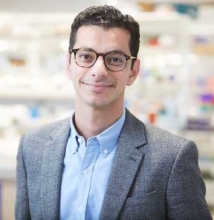BME Lecture Series: Ahmad (Mo) Khalil, Boston University

Assistant Professor
Department of Biomedical Engineering
Associate Director
Biological Design Center
Abstract: Eukaryotic organisms display complex genetic responses to the environment. This complexity is thought to arise from elaborate regulatory networks that enable cells to perform the exponentially large number of computations necessary for regulation and organismal development. To study how these molecular circuits function and evolve, we develop engineering approaches and apply them predominately to the biological systems controlling eukaryotic gene transcription. First, I will describe our synthetic biology approach of applying natural design principles of transcriptional and epigenetic systems to artificial cellular circuits, showing how these can program complex signal processing and epigenetic functions in cells. Second, I will describe a new DIY technology platform we developed, called eVOLVER, that enables the design of automated, high-throughput continuous culture experiments to characterize and continuously evolve biological systems in the laboratory.
Bio: Ahmad (Mo) Khalil is an assistant professor of biomedical engineering and the founding associate director of the Biological Design Center at Boston University. He is also a visiting scholar at the Wyss Institute for Biologically Inspired Engineering at Harvard University. His research is focused on how molecular circuits enable core cellular functions, such as decision-making, computation and epigenetic memory. His team primarily applies synthetic biology approaches to interrogate the function and evolution of these cellular systems. He is recipient of numerous awards, including the Presidential Early Career Award for Scientists and Engineers (PECASE), NIH New Innovator Award, NSF CAREER Award, DARPA Young Faculty Award, and the Hartwell Foundation Biomedical Research Award. Khalil was an HHMI postdoctoral fellow with James Collins at Boston University. He obtained his doctorate from MIT and his bachelor's degree (Phi Beta Kappa) from Stanford University.
Share
Upcoming Events
-
MSE 298 Seminar: Molecular Modeling in the Age of AI - From Energy Materials to Device Simulations
-
CBE 298 Seminar: Metal Electrodeposition for Modern Mineral Refining
-
MSE 298 Seminar: Quasi-1D/2D Charge-Density-Wave Materials - From Exotic Physics to Application Prospects
-
EECS Seminar: Steering Diffusion Models for Generative AI, From Multimodal Priors to Test-Time Scaling
-
CBE 298 Seminar: Finding Catalysts of Gut Reactions - The Gut Microbiota in Disease Onset and Treatment
